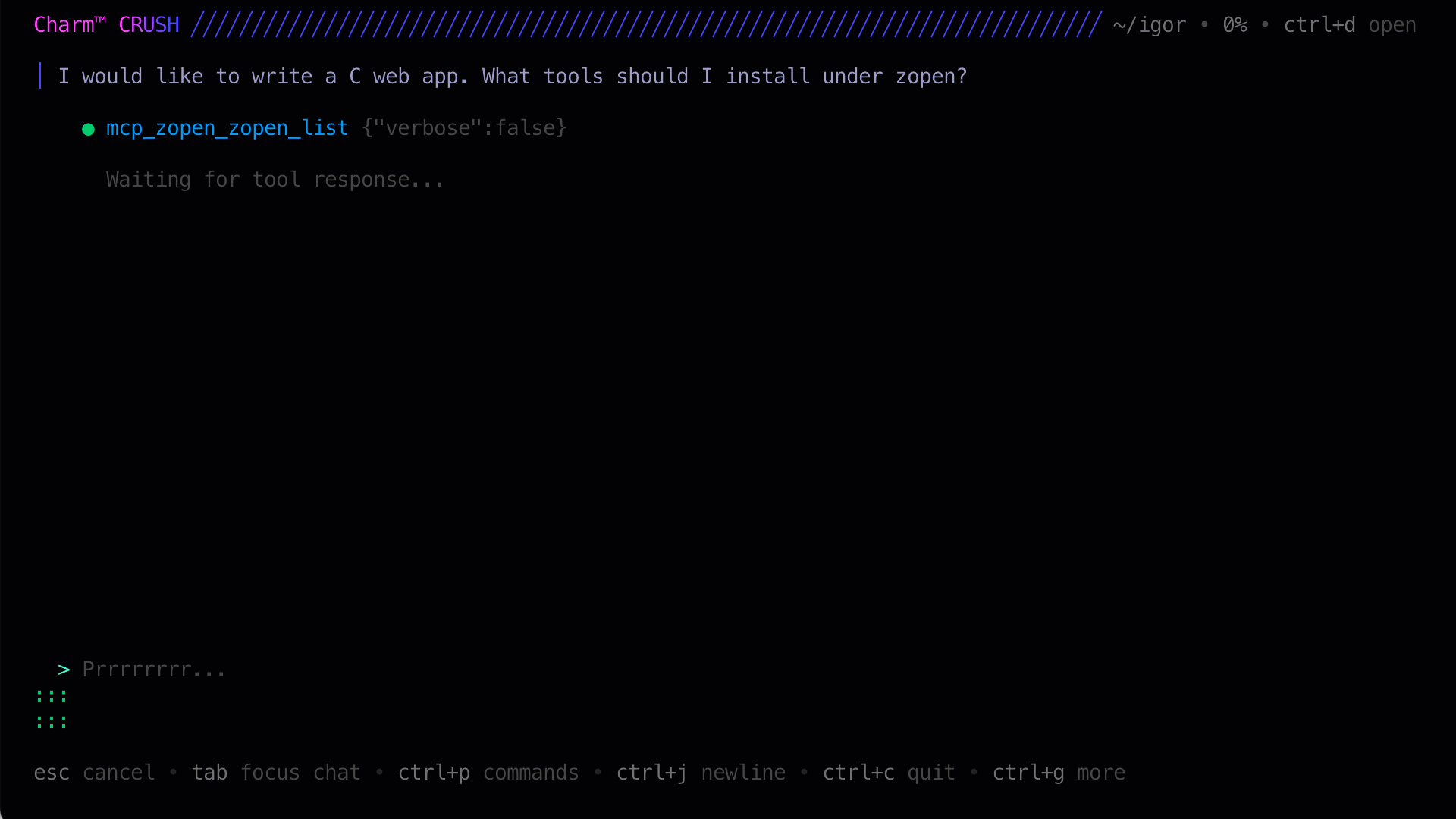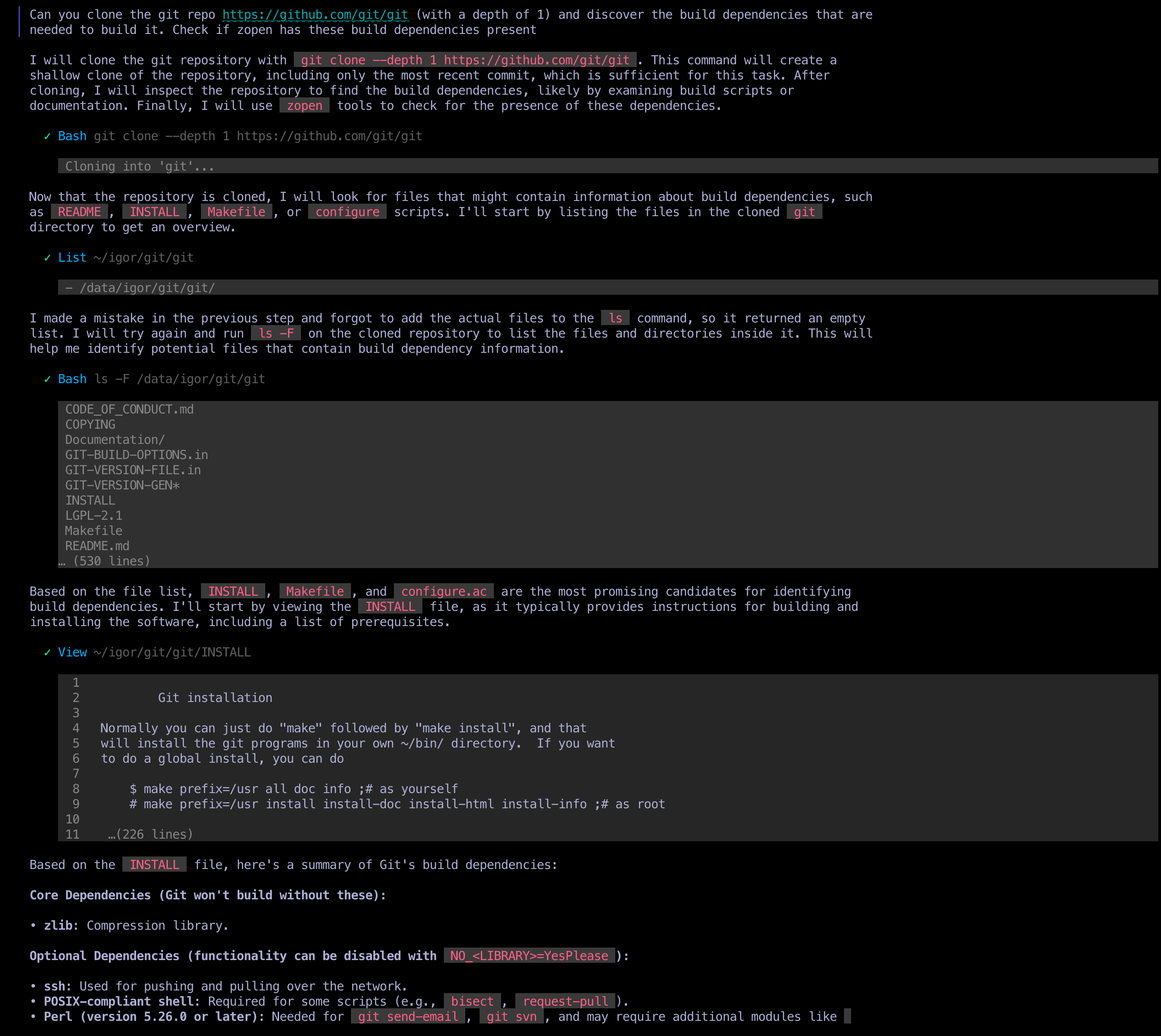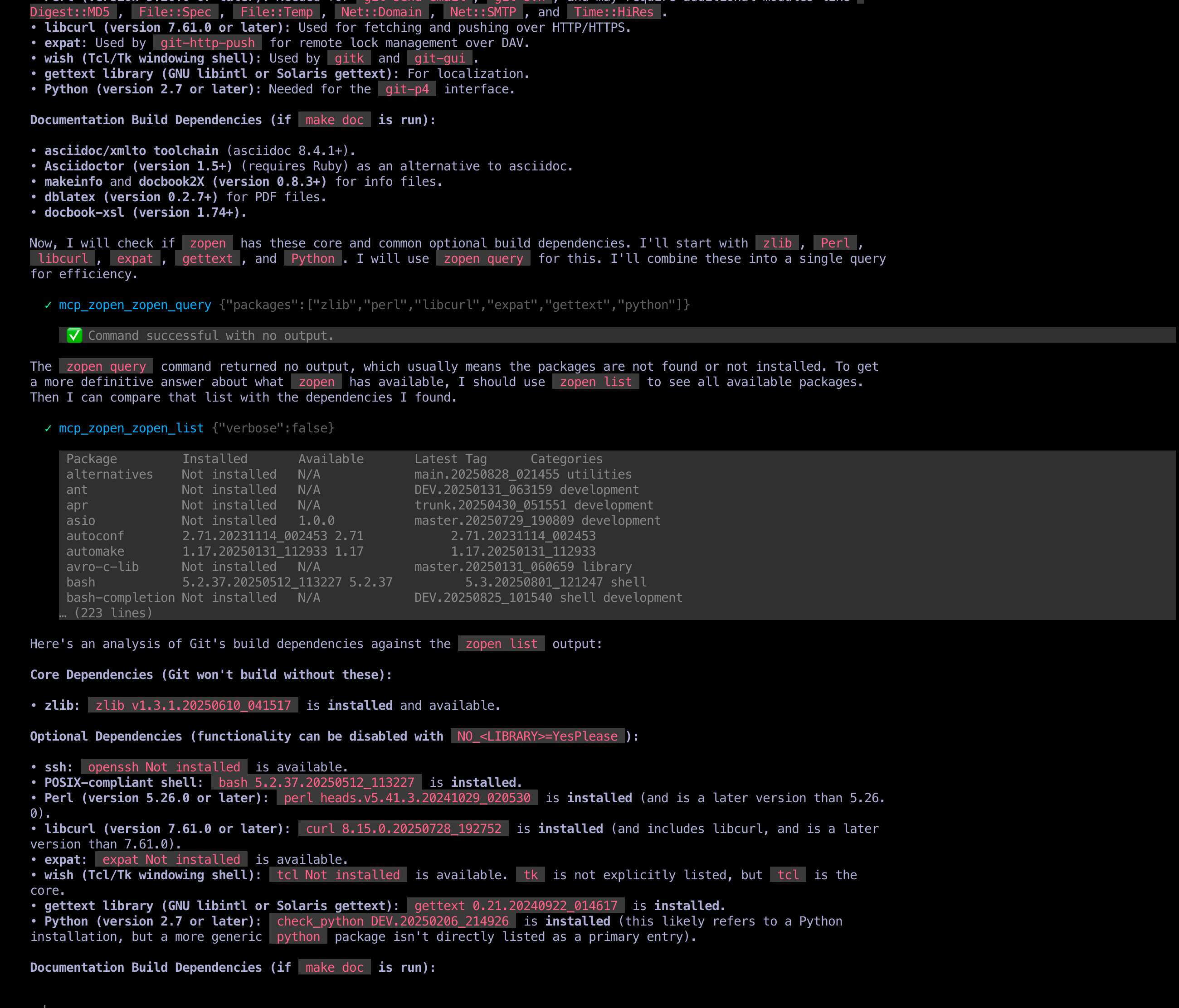As a developer in the zopen community, I’m always looking for ways to streamline my workflow on z/OS. With the rise of agentic AI, I started wondering if I could “agentify” my z/OS workflow.
Imagine being able to use natural language to automate tasks with familiar tools. For example, what if I could simply ask: “Show me all of the installed zopen packages that need updating” or “Install everything I need for web development”, and have the AI use its knowledge and the zopen package manager to carry out the task?
Thanks to Large Language Models (LLMs) and the Model Context Protocol (MCP), this is now possible directly on z/OS!
To make this work, we combine several key technologies:
- A custom zopen MCP Server that translates AI requests into real zopen commands.
- Ollama or LLama.cpp, running an open-source language model directly on your workstation or on z/OS.
- Crush, an open-source terminal-native AI agent that ties everything together.
What is MCP
Before we start, let’s explain MCP. The Model Context Protocol (MCP) is an open standard designed to let AI models safely and reliably interact with external tools (like git, grep and in our case zopen) and data. The way I think of it is as a universal adapter. It defines a standard language that any AI agent can use to “talk” to any tool that also speaks that language.
The design of MCP is heavily inspired by the success of the Language Server Protocol (LSP), which I covered in another blog. Just as LSP created a standard for code editors to communicate with language analysis tools, MCP creates a standard for AI agents to communicate with any tool or data source. This open-standard approach encourages a rich ecosystem where any tool provider can make their service AI-ready, and any AI agent, like Crush, can consume it.
Prerequisites
Before we begin, you’ll need the following:
- Go 1.23 or later. For z/OS, you can get Go from the IBM Open Enterprise SDK for Go product page.
- An environment with
zopeninstalled (either locally or on a remote z/OS system). Use these instructions if you don’t have zopen installed.
Step 1: Choose Your Language Model
The core of our agent is the Large Language Model. You can leverage any LLM, but given that the zopen community is all about open-source I am going to leverage an open-source model. Whether you run it remotely or on z/OS is up to you.
Option A (Recommended): Run the Model remotely (in my case my Workstation) with Ollama
For the best performance and responsiveness, running the LLM on a workstation (as opposed to directly on z/OS) is the ideal choice as long as you have a GPU or Mac M series. Choosing the right model is important and will impact how well the automation workflow behaves.
For simplicity, I am going to install the LLM on my Mac using Ollama.
If you use Homebrew, you can install it via the command line.
1
brew install ollama
I’m going to use Qwen3, because it’s a fairly lightweight model (8b parameter model) and it does well at most coding tasks. If you have enough VRAM, then I would suggest Qwen-3-Coder as it is tuned for agentic coding.
In your terminal, run the following command to get the qwen3:8b model:
1
2
3
# On your workstation
ollama serve &
ollama run qwen3:8b
Now leave the Ollama application running in the background on your workstation.
Option B: Run the Model Directly on z/OS with llama.cpp
For a fully self-contained solution, you can now run a model server directly on z/OS. Follow my previous blog on how to set that up. One reason for running LLaMa.cpp locally on z/OS is security. Data on z/OS machines is typically sensitive, and as such, many clients choose to air-gap their systems. (Air-gapping isolates a computer or network from external connections). For sensitive industries like finance and healthcare, local AI models are critical for security by limiting exposure to external threats.
Step 2: The zopen MCP Server - Our Custom Tool Bridge
This is the component we built ourselves. The zopen-mcp-server is a Go application that acts as a translator. It listens for MCP requests from our AI agent (Crush) and converts them into zopen commands. We use the official go mcp sdk to create the MCP server. Its core components are:
- The
mcp.NewServerFunction: Creates the main server instance. - The
mcp.AddToolFunction: This is the key. It turns a Go function into a capability that the AI can discover and use. The tool’s description is crucial, as it tells the AI what the tool does. - The
mainFunction: This handles startup and configuration, allowing the server to be run as a standalone executable.
The end result is our zopen mcp server, available at https://github.com/IgorTodorovskiIBM/zopen-mcp-server.
To install the server on z/OS, you can use go install:
1
2
# On z/OS
go install github.com/IgorTodorovskiIBM/zopen-mcp-server@v1.0.0
Available Tools in the zopen MCP server
The zopen-mcp-server now supports the following commands:
zopen_list: Lists information about zopen community packages.zopen_query: Lists local or remote info about zopen community packages.zopen_install: Installs one or more zopen community packages.zopen_remove: Removes installed zopen community packages.zopen_upgrade: Upgrades existing zopen community packages.zopen_info: Displays detailed information about a package.zopen_version: Displays the installed zopen version.zopen_init: Initializes the zopen environment.zopen_clean: Removes unused resources.zopen_alt: Switches between different versions of a package.
You can also run it remotely if you choose to run your Crush AI agent on your workstation.
Step 3: Crush, Your Terminal Agent - Now on z/OS!
Crush is an AI agent that runs directly in your z/OS terminal.
According to the Crush repository, it offers a rich set of features:
Features
- Multi-Model – Choose from a wide range of LLMs or add your own.
- Built-in Tools – Crush comes with support for a variety of tools out-of-the-box to interact with your system, including bash, download, edit, grep, ls, rg, and view.
- Flexible – Switch LLMs mid-session while preserving context.
- Session-Based – Maintain multiple work sessions and contexts per project.
- LSP-Enhanced – Leverages LSPs for additional context, just like your editor.
- Extensible – Add capabilities via MCPs (http, stdio, and sse). We use the stdio transport for increased security.
And now, thanks to the zopen community, Crush has been ported to z/OS. You can install it using zopen:
1
2
# On z/OS
zopen install crush
Before we initialize crush, we need to configure it to use our local LLM.
Configuring Crush: The crush.json File
The crush.json file tells Crush how to connect all the pieces. The configuration will differ slightly depending on your chosen deployment model.
Configuration for Workstation Model + z/OS Tools
In this setup, Crush runs on z/OS, talks to your zopen server on z/OS, but gets its knowledge from the Ollama server running back on your workstation.
First, create the file in the standard location:
1
2
mkdir ~/.local/share/crush/
vim ~/.local/share/crush/crush.json
Copy and adjust these contents appropriately:
1
2
3
4
5
6
7
8
9
10
11
12
13
14
15
16
17
{
"$schema": "https://charm.land/crush.json",
"providers": {
"ollama": {
"name": "Ollama Workstation",
"base_url": "http://<your_ip>:11434/v1/",
"type": "openai",
"models": [{"name": "Qwen3 8B", "id": "qwen3:8b"}]
}
},
"mcp": {
"zopen": {
"type": "stdio",
"command": "/path/on/zos/to/zopen-mcp-server"
}
},
}
The Result: An AI-Powered z/OS Workflow!
With your crush.json file in place, simply run crush in your z/OS terminal. Crush will start, connect to your chosen LLM server, and launch your zopen-mcp-server as a subprocess.
From here, you can start giving it tasks to automate!
Can you clone the git repo https://github.com/git/git (with a depth of 1) and discover the build dependencies needed to compile it? Check if zopen already has these dependencies available.
As you can see, Crush already supports many tools, including git and view, which allow it to clone repositories and inspect their contents. It also leverages our zopen-mcp-server to check package availability on z/OS.
In this example, Crush cloned the Git repository, inspected the INSTALL file, and produced a dependency analysis:
- Core dependencies found in zopen:
zlib,bash,Perl,libcurl,gettext,python. - Optional dependencies missing or partially available:
expat,openssl,tcl/tk,xmlto. - Documentation tools not explicitly packaged in zopen:
asciidoc,makeinfo,docbook2X,dblatex,docbook-xsl.
Crush was able to summarize this automatically, saving the manual effort of digging through build scripts.
Pretty awesome!
Feel free to experiment. You can ask it anything, from understanding your codebase to making changes to it!
Next Steps: An AI Assistant for Porting Apps
While package management is a great first step, the real power of agentic AI lies in automating complex, knowledge-intensive tasks. My next goal is to tackle one of the most time-consuming parts of my workflow: porting new open-source applications to z/OS.
Agentic AI can also assist with debugging issues during the porting process—and much more. Exciting times ahead!
Thank you to Mike Fulton, Bill O’Farrell and Andrew Sica for reviewing this post and providing valuable feedback!
 Agentic AI running directly on z/OS!
Agentic AI running directly on z/OS!


